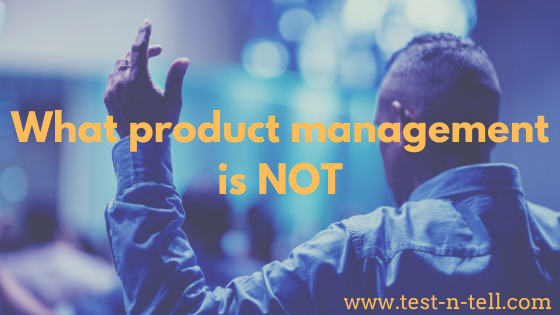Lately, I hear more and more questions about how to become a product manager. I guess people look at the average PM salary and it looks appealing. Maybe folks are exposed to PMs in their own organisation and they think they could do this job. However, before committing to the switch it’s useful to know what product management is and what it is not, to avoid disappointment.
Before we dive in it's important to note that product management could differ greatly between organisations so not everything below could apply.
Product management is not about glory
All experienced PMs know: if something goes wrong - it’s your fault, if something goes well - it’s someone else’s praise. PMs rarely get recognition and always are responsible for success. That often comes as news to fresh PMs who thought they'll be "mini-CEOs" and single-handedly will make their product huge successes. In reality, though, the product is never done and even when you've just made something great, the very next second people ask you to do more.Product management is not about control
Usually, PMs are not bosses to anyone. We need to exercise servant leadership to the fullest in order to get things done. PMs are all about telling stories, convincing, negotiating, bargaining and asking.Strangely, but I've talked to a few companies lately where PMs are actual line managers for their product teams (developers, QAs, designers). I think this might be a side-effect of a "mini-CEO" myth, one that went too far. In high performing cross-functional product teams healthy tensions exist, people challenge each other's ideas so only the best could win. Making PM (or anyone on the same team) a boss could ruin this balance and lead to subpar product outcomes.
Product management is not about individual contributions
There is still this myth about a genius PM who single-handedly decide everything about their product. They know exactly what customers want without even talking to them. They come up with this genius innovative design. They tell developers how to code it. They write killer press releases and personally close multimillion deals. Their product is perfect from day one so they can retire to their private island to enjoy life.Sadly, this never happens. In reality, PMs are only as good as the people they are working with. Product management is mainly about collaboration, feedback, learning and many many cycles until something is good enough to solve customer problems. Most PMs are mainly facilitators of this process, they are responsible for product success that could be achieved through the work of others.
Product management is not about work-life balance
Most PMs I know don’t work classic nine to five. Habitually, it is more, rarely less and often it’s uneven. Product management happens in sprints (not talking about scrum here). Sometimes PMs are terribly busy, there are hundreds of tasks they need to do and it becomes easy to never stop working. Time management skills are critical to PM job so as willpower to stop working and care about your physical and mental wellbeing.At times PMs have slow days. When their teams are busy working, there is enough time till the next release, no major events on the horizon and so on. Then PMs can allow themselves to methodically do market research, or finally refine some of the product documentation, or tweak the prototype bouncing new ideas of a designer. Seasoned PMs learn the hard way how to get the job done and not burn out in the process.
